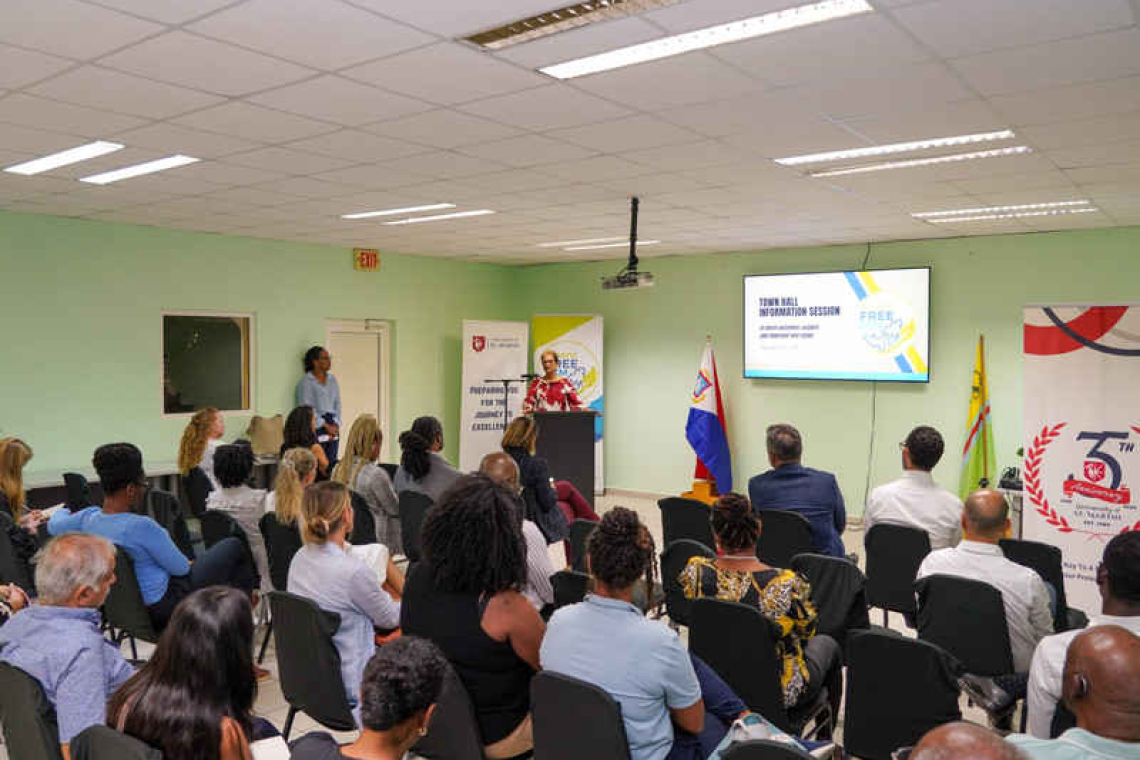Chairperson of Parliament Sarah Wescot-Williams (at podium) during the session.
PHILIPSBURG--The St. Maarten Development Fund (SMDF), in collaboration with the government of St. Maarten, on Tuesday evening hosted a Plastic Free SXM Town Hall Meeting to discuss proposed legislation aimed at significantly reducing single-use plastics and Styrofoam products on the island.
The proposed legislative framework, which was submitted to the Ministry of General Affairs in December 2024, seeks to restrict the production, importation, distribution and sale of specific single-use plastic and polystyrene foam products. The legislation outlines a phased implementation approach that begins with restrictions on polystyrene food containers, single-use plastic bags, plastic straws and plastic stirrers. A second phase of the legislation will expand these restrictions to include plastic cutlery, plates, bowls and cups.
To ensure a smooth transition, the legislation includes a structured phase-out schedule, with six-month intervals between the bans at various levels of the supply chain – from production and importation to local wholesale distribution and retail sale.
“Since 2018, President of Parliament [Member of Parliament – Ed.] (MP) Sarah Wescot-Williams has championed the reduction of single-use plastic items and led the introduction of the 'Plastic Ordinance', which banned single-use plastic bags and straws in 2020. However, enforcement proved challenging due to the manpower required for inspections. To strengthen these efforts, the proposed legislation adds new mechanisms such as the ban on importation and distribution of these items, meaning that fewer single-use items will be able to enter our borders. In a phased approach, the list of banned single-use plastics will also expand," explained Makhicia Brooks, Managing Director of SMDF.
MP Wescot-Williams also addressed the crowd at the Town Hall, and noted: “We’ve long known the damage single-use plastics cause to our island. While I would have liked to see action sooner, I’m hopeful that this legislation will push us toward a cleaner, more
sustainable St. Maarten.”
Prime Minister Dr. Luc Mercelina also expressed urgency and hope, stating, “Waste management has long been one of St. Maarten’s biggest challenges, and we all see the impact of plastic pollution in our daily lives – on our beaches, in our neighbourhoods and in our environment. This legislation isn’t just about policy; it’s about changing the way we think about waste and protecting the island we call home. There’s still work to do, but this is a meaningful step toward a cleaner, more sustainable future for all of us.” Other dignitaries present included Minister of Justice Nathalie Tackling and MPs Sjamira Roseburg and Dimar Labega.
To support the implementation of the proposed legislation, SMDF has developed various communication materials that will be handed over to the Ministry of General Affairs. These materials include a dedicated website, educational videos, guidelines for residents and businesses, an activity book designed for primary school pupils, and video and radio public service announcements. Recognising the diverse population of St. Maarten, several of these resources will be made available in four languages – English, French, Spanish and Haitian Creole.
During the meeting, SMDF also shared findings from its data collection efforts, which have guided the development of the regulatory framework. The data showed a general awareness of the impending changes and the availability of viable alternatives to plastic products. However, concerns were raised regarding the prevalence of "greenwashed" items – products marketed as sustainable, but which may not meet environmental standards. The findings also indicated a low projected cost impact for businesses and consumers, as well as an undisturbed supply chain, ensuring that businesses can smoothly transition to compliant alternatives.
Brooks: “We’ve also met with wholesalers regarding the proposed import bans, and they have been supportive of the process. They indicate that as long as the regulations are clearly communicated with a fair transition timeline, they support the new regulations. We have also held several meetings with the Ministries of Justice, [Tourism, Economic Affairs, Transport and Telecommunication] TEATT and [Public Housing, Spatial Planning, Environment and Infrastructure] VROMI to discuss how the import ban can be enforced, and a training is planned with the relevant stakeholders that would be enforcing these regulations.”
If approved by Parliament, the proposed legislation includes measures for enforcement
and review. A multidisciplinary enforcement team under the minister of justice will oversee compliance, with administrative fines set at the fifth category. Additionally, a formal review of the law’s effectiveness is required within five years of implementation to assess its impact and make necessary adjustments.
“With the legislation now in the hands of the government of St. Maarten, the next steps involve finalising its trajectory towards Parliament for approval. SMDF remains committed to working alongside government agencies, businesses and environmental organisations to support the transition to more sustainable practices,” Brooks concluded.
Plastic Free SXM is supported by the Resilience, Sustainable Energy and Marine Biodiversity Programme RESEMBID, funded by the European Union and implemented by Expertise France. For continued updates, the public is encouraged to follow Plastic Free SXM on Facebook and Instagram or visit
www.plasticfree.sx for more information.







